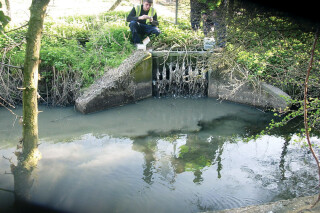Campaigners are calling for a programme of emergency investment in sewage treatment works to deal with what they say is a worsening pollution crisis having a devastating effect on England’s streams, rivers and coastlines.
Lack of works capacity is resulting in regular discharges of raw sewage from treatment works into the surrounding waterways – a situation that is only supposed to happen in times of extreme wet weather to stop local homes and properties from flooding.
Now the issue is beginning to affect new housing projects as calls grow for developments to be postponed or cancelled unless water companies can show that they are able to deal with the increased effluent without polluting the local environment.
The issue has received fresh impetus with the publication of new research from Imperial College London, which says that inadequate infrastructure investment is clearly at the root of the problem.

The researchers explain that the UK sewer system combines wastewater from domestic, commercial and industrial activities with stormwater runoff and funnels it to treatment works. In times of heavy rainfall the infrastructure can become overloaded and when that happens combined sewer overflows (CSOs) discharge some of this raw sewage into natural watercourses before it reaches a treatment works.
However, Imperial’s research shows that these CSOs are increasingly being used even in spells of dry weather. And these overspills lead to environmental deterioration and can pose a threat to human health, for example through enteroviruses that cause gut infections, or the proliferation of antibiotic resistance.
Further analysis has shown that most of the increase in overspills is due to the treatment works’ lack of capacity to deal with increased flows as populations have risen and industrial activities have scaled up. It concluded that the capacity of many treatment works is not sufficient, even in the absence of extreme rainfall.
The results of the research were published in the journal Environmental Science: Water Research & Technology. Professor Nick Voulvoulis, from the Centre for Environmental Policy at Imperial, says:
“Our findings reveal the chronic under-capacity of the English wastewater systems as a fundamental cause behind the increased frequency and duration of CSO spills.
“We hope this work can help the water industry demonstrate the need for capital investment in infrastructure. It is often taken for granted but investing in infrastructure is critical to our future prosperity.”
The growing concern at the inadequate investment is country-wide and fuelling increasingly vocal campaigns.
At the end of last year, campaign group Stop Sewage Pollution at Whitburn persuaded Sunderland City Council to ask the government to set up a public enquiry into the local sewage system, and especially the large amount of untreated sewage being discharged by Northumbrian Water’s Whitburn long sea outfall.

On the south coast, Southern Water has faced accusations of environmental vandalism as local groups have protested against the growing discharge of untreated sewage around the coastline.
The scale of the problem is underlined by a group of experts who have been tracking all the sewage treatment works in the Upper Thames region around Oxford and who published their third report, The Rivers Around Oxford, at the end of December 2022.
The Oxford Rivers Improvement Campaign (ORIC) was formed in 2020 in response to growing concerns about the state of the rivers Thames and Cherwell in Oxford and the tributaries flowing into them. Specifically, the group was concerned about the environmental and human impact of rapidly increasing levels of sewage discharge.
ORIC’s founding members include Mark Hull, a former water industry consultant and university economics lecturer, and Bill Kingdom, the former global lead for water supply and sanitation at the World Bank.

ORIC says its research into the level of sewage discharges into the upper Thames shows that three-quarters of all treatment works in the area have insufficient capacity and that Thames Water’s proposed levels of investment will fail to deal with what is a worsening problem driven by population growth.
Their work is the result of an 18-month study tracking 106 sewage treatment works in the upper Thames and updates previous reports published in January and April 2022.
This new analysis shows that 81 sewage treatment works need investment to increase capacity but only 15 will get it in the current five-year planning period. In addition, even where investment is planned to go ahead, it is often seriously inadequate.
Over the past two years, Oxford sewage treatment works has been discharging large volumes of untreated sewage into the main river Thames for up to 35 hours a week. The facility has only 62% of the required capacity for today’s population.

Given the volume of new housing, Oxford sewage treatment works’ capacity needs to be doubled if it is to meet demand and the Environment Agency’s standard requirements – yet it will have its capacity expanded by just 24%.
ORIC is calling for an immediate emergency investment programme to enhance wastewater treatment capacity and Thames Water to face punitive regulatory fines until it substantially improves its performance, with the proceeds from the fines to be directly used for wastewater investment.
The group also wants to see planning approvals for all major developments to be contingent on adequate treatment capacity and – controversially – for the government to begin the process of removing Thames Water’s licence to operate.
“Our work underlines the urgent need for a programme of emergency investment to deal with what is a worsening crisis –and a crisis that Thames Water is simply not dealing with,” says Mark Hull.
“The company is showing neither the required urgency nor the will to deal with this issue. More aggressive regulatory action and fines will provide stronger incentives for a change in corporate behaviour.
“But given their track record so far, we have little faith that the company is capable of dealing with this issue, which is why we are calling on the government to start the process of removing Thames Water’s licence to operate,” says Hull.

The water companies say they are acutely aware of local concerns and are taking action. But campaigners counter by claiming that the proposed investments are nowhere near what is required.
Last June, Thames Water announced additional investment, but campaigners like ORIC believe that more will be needed. The upgrade of Oxford sewage treatment works alone will cost in the region of £130m, they claim.
A Thames Water spokesperson said: “Taking action to improve the health of rivers is a key focus for us and our current investment programme, which is fully funded, will deliver major increases in treatment capacity at many of our sites.
“Thames Water’s shareholders approved an additional £2bn of investment into the business last year as part of our turnaround plan to improve performance and outcomes for customers, leakage and river health.
“Our shareholders are in it for the long term and have not taken a dividend for five years to prioritise investment in improving service for customers and to protect the environment.”
Hull continues: “Obviously, this is not just an issue for Oxford and Thames Water, but the whole country. The water industry is suffering from decades of under investment. Current investment plans are completely inadequate, and we believe show no serious attempt to deal with future demand.
“The required investment can be delivered without significantly impacting people’s water bills – all that is lacking is the political will.”
The rows also show the potential impact of the lack of sewage treatment capacity on new housing projects with planning departments dealing with growing numbers of objections from environmental groups.
One example near Oxford is the plan for new housing in Iffley, which ORIC is opposing because the development will increase the load on Oxford sewage treatment works.
It says: “ORIC submits that Oxford STW is unfit for purpose and that Thames Water’s planned expansion will not make it fit for purpose. Until Oxford STW is truly fit for purpose...we believe all major developments feeding this STW should be halted at the planning stage, including this one.”
Hull adds: “To be clear, we are not at all opposed to housing development – it is clearly needed, especially in the social housing sector. But it is essential that proper plans are put in place to remove and treat the effluent that will be produced.
“Much poorer developing countries manage to do this. Why can’t we?”

Got a story? Email news@theconstructionindex.co.uk


